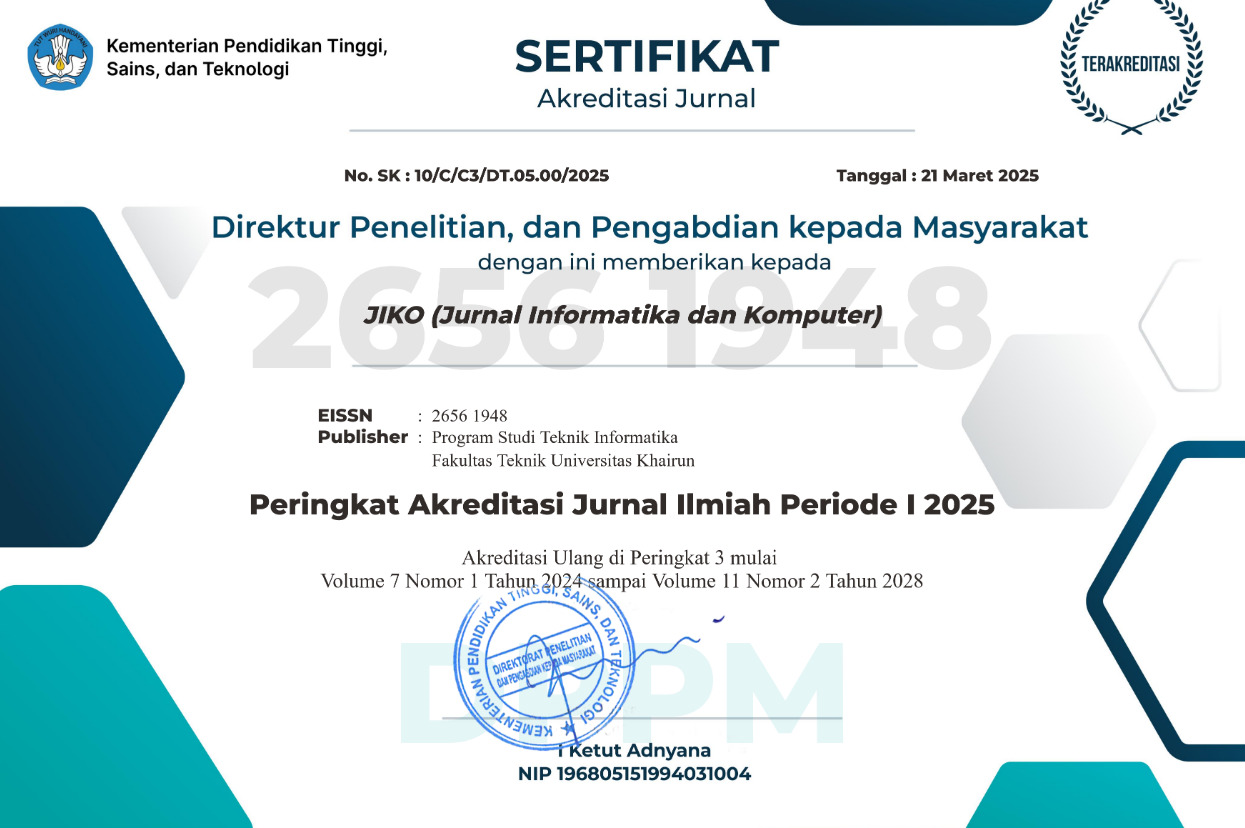EVALUASI FAKTOR KEGAGALAN SISTEM INFORMASI PADA KESIAPAN PENERAPAN E-GOVERNMENT: STUDI LITERATUR
Abstract
Full Text:
PDF (Bahasa Indonesia)References
United nation, E-GOVERNMENT SURVEY 2014. 2014.
R. Meiyanti, B. Utomo, D. I. Sensuse, and R. Wahyuni, “E-Government Challenges in Developing Countries: A Literature Review,†2018 6th Int. Conf. Cyber IT Serv. Manag. CITSM 2018, no. Citsm, pp. 1–6, 2019.
E. Loukis and Y. Charalabidis, “Why do e-government projects fail? Risk factors of large information systems projects in the Greek public sector: An international comparison,†Int. J. Electron. Gov. Res., vol. 7, no. 2, pp. 59–77, 2011.
R. Heeks, “Health information systems: Failure, success and improvisation,†Int. J. Med. Inform., vol. 75 2, pp. 125–137, 2006.
B. Kitchenham, “Procedures for Performing Systematic Literature Reviews,†Jt. Tech. Report, Keele Univ. TR/SE-0401 NICTA TR-0400011T.1, p. 33, 2004.
L. Glyptis, M. Christofi, D. Vrontis, M. Del Giudice, S. Dimitriou, and P. Michael, “E-Government implementation challenges in small countries: The project manager’s perspective,†Technol. Forecast. Soc. Change, vol. 152, no. September 2019, 2020.
M. Toots, “Why E-participation systems fail: The case of Estonia’s Osale.ee,†Gov. Inf. Q., vol. 36, no. 3, pp. 546–559, 2019.
J. Rajapakse, A. Van Der Vyver, and E. Hommes, “E-Government implementations in developing countries: Success and failure, two case studies,†ICIAFS 2012 - Proc. 2012 IEEE 6th Int. Conf. Inf. Autom. Sustain., pp. 95–100, 2012.
J. Floropoulos, C. Spathis, D. Halvatzis, and M. Tsipouridou, “Measuring the success of the Greek Taxation Information System,†Int. J. Inf. Manage., vol. 30, no. 1, pp. 47–56, 2010.
M. Guntur, B. Purwandari, T. Raharjo, I. Solichah, and L. Kumaralalita, “Critical Success Factors for information systems development: A case study in e-government,†ACM Int. Conf. Proceeding Ser., pp. 29–33, 2018.
J. K. Putri, “Obstacle Factor Analysis o f E-Government,†2018 Int. Conf. Adv. Comput. Sci. Inf. Syst., pp. 57–62, 2018.
A. Y. Gheni, Y. Y. Jusoh, M. A. Jabar, and N. M. Ali, “The critical success factors (CSFs) for IT projects,†J. Telecommun. Electron. Comput. Eng., vol. 9, no. 3-3 Special Issue, pp. 13–17, 2017.
H. Choi, M. J. Park, J. J. Rho, and H. Zo, “Rethinking the assessment of e-government implementation in developing countries from the perspective of the design–reality gap: Applications in the Indonesian e-procurement system,†Telecomm. Policy, vol. 40, no. 7, pp. 644–660, 2016.
J. R. Gil-Garcia and D. S. Sayogo, “Government inter-organizational information sharing initiatives: Understanding the main determinants of success,†Gov. Inf. Q., vol. 33, no. 3, pp. 572–582, 2016.
A. I. Almajed and P. Mayhew, “An empirical investigation of IT project success in developing countries,†Proc. 2014 Sci. Inf. Conf. SAI 2014, pp. 984–990, 2014.
D. Fitrianah, N. H. Praptono, A. N. Hidayanto, and A. M. Arymurthy, “A Conceptual Framework of Critical Success Factors to Develop an Integrated Application of Tuna Fishing Data Management in Indonesia,†pp. 113–118, 2014.
H. Elkadi, “Success and failure factors for e-government projects : A case from Egypt,†Egypt. Informatics J., vol. 14, no. 2, pp. 165–173, 2013.
C. C. Mussi, C. D. do Valle Pereira, R. T. de Oliveira Lacerda, and E. M. dos Santos, “Pre-Implementation evaluation of a nationwide information system for university hospitals: lessons learned from a study in Brazil,†Behav. Inf. Technol., vol. 37, no. 3, pp. 217–231, 2018.
D. Lehman and C. Ruzich, “Identifying the Critical Success Factors for Information Systems to Manage Sponsored Research Activities at Institutions of Higher Education,†J. Inf. Syst. Appl. Res., vol. 10, no. 3, p. 4, 2016.
R. Sweis, “An Investigation of Failure in Information Systems Projects: The Case of Jordan,†J. Manag. Res., vol. 7, no. 1, p. 173, 2015.
A. I. Almajed and P. Mayhew, “The critical success factors of IT projects in Saudi Arabian public organizations,†Entrep. Vis. 2020 Innov. Dev. Sustain. Econ. Growth - Proc. 20th Int. Bus. Inf. Manag. Assoc. Conf. IBIMA 2013, vol. 1, no. September 2014, pp. 849–856, 2013.
M. Abouzahra, “Causes of failure in Healthcare IT projects,†3rd Int. Conf. Adv. Manag. Sci., vol. 19, pp. 46–50, 2011.
H. S. A. Nawi, A. A. Rahman, and O. Ibrahim, “Government’s ICT project failure factors: A revisit,†2011 Int. Conf. Res. Innov. Inf. Syst. ICRIIS’11, pp. 2–7, 2011.
S. ELKheshin and N. Saleeb, “ASSESSING THE ADOPTION OF E-GOVERNMENT USING TAM MODEL: CASE OF EGYPT Sara,†Int. J. Manag. Inf. Technol. Vol.12, vol. 12, no. 1, pp. 1–14, 2020.
M. Al-Emran, V. Mezhuyev, and A. Kamaludin, “Technology Acceptance Model in M-learning context: A systematic review,†Comput. Educ., vol. 125, pp. 389–412, 2018.
S.-C. Chen, S.-H. Li, and C.-Y. Li, “RECENT RELATED RESEARCH IN TECHNOLOGY ACCEPTANCE MODEL: A LITERATURE REVIEW,†Aust. J. Bus. Manag. Res., vol. 1, no. 9, pp. 124–127, 2011.
H. E. Çelik and V. Yilmaz, “Extending the technology acceptance model for adoption of e-shopping by consumers in Turkey,†J. Electron. Commer. Res., vol. 12, no. 2, pp. 152–164, 2011.
D. K. Mohanachandran and N. S. Govindarajo, “Theory of reasoned action and citizen’s voting behaviour,†Pertanika J. Soc. Sci. Humanit., vol. 28, no. 1, pp. 695–715, 2020.
O. C. Otieno, S. Liyayla, and B. C. Odongo, “Theoretical and Practical Implications of Applying Theory of Reasoned Action in an Information Systems Study,†OALib, vol. 02, no. 12, pp. 1–5, 2015.
R. J. Angelina, A. Hermawan, and A. I. Suroso, “Analyzing E-Commerce Success using DeLone and McLean Model,†J. Inf. Syst. Eng. Bus. Intell., vol. 5, no. 2, p. 156, 2019.
H. P. Steinbacher, “Evaluation by using the information system success model,†Proc. IADIS Int. Conf. Inf. Syst. 2013, IS 2013, no. March 2013, pp. 361–364, 2013.
H. Gunawan, B. L. Sinaga, and W. P. Sigit Purnomo, “Assessment of the readiness of micro, small and medium enterprises in using E-money using the unified theory of acceptance and use of technology (UTAUT) method,†Procedia Comput. Sci., vol. 161, pp. 316–323, 2019.
K. B. Shiferaw and E. A. Mehari, “Modeling predictors of acceptance and use of electronic medical record system in a resource limited setting: Using modified UTAUT model,†Informatics Med. Unlocked, vol. 17, no. April, p. 100182, 2019.
V. Venkatesh, J. Y. L. Thong, and X. Xu, “Consumer Acceptance And Use of Information Technology: Extending The Unified Theory of Acceptance And Use of Technology,†MIS Q., vol. 36, no. 1, pp. 157–178, 2012.
R. Pauluzzo and E. F. Geretto, “Validating the EUCS model to measure the level of satisfaction of Internet users in local banks in Italy,†J. Organ. End User Comput., vol. 30, no. 1, pp. 66–81, 2018.
B. Prasetyo, R. W. E. Yulia, and Felisia, “Measuring end-user satisfaction of online marketplace using end-user computing satisfaction model (EUCS Model) (Case study: Tokopedia.com),†Proc. 2017 4th Int. Conf. Comput. Appl. Inf. Process. Technol. CAIPT 2017, vol. 2018-Janua, pp. 1–5, 2018.
L. M. Erlirianto, A. H. N. Ali, and A. Herdiyanti, “The Implementation of the Human, Organization, and Technology-Fit (HOT-Fit) Framework to Evaluate the Electronic Medical Record (EMR) System in a Hospital,†Procedia Comput. Sci., vol. 72, pp. 580–587, 2015.
D. Napitupulu, D. I. Sensuse, and Y. G. Sucahyo, “Sosio-technical factors of e-government implementation,†Int. Conf. Electr. Eng. Comput. Sci. Informatics, vol. 4, no. September, pp. 690–695, 2017.
A. Fauzie, D. I. Sensuse, I. Budi, W. C. Wibowo, Fitroh, and R. Kunthi, “Propose of critical success factors for e-Hajj implementation in Indonesia,†J. Eng. Appl. Sci., vol. 12, no. 7, pp. 1806–1810, 2017.
H. W. Kim, “The effects of switching costs on user resistance to enterprise systems implementation,†IEEE Trans. Eng. Manag., vol. 58, no. 3, pp. 471–482, 2011.
T. J. Hess, K. Joshi, and A. L. McNab, “An alternative lens for understanding technology acceptance: An equity comparison perspective,†J. Organ. Comput. Electron. Commer., vol. 20, no. 2, pp. 123–154, 2010.
H. Lu, P. Lin, C. Lo, and M. Wu, “A Review of Information System Evaluation Methods,†Int. Conf. Softw. Comput. Appl. (ICSCA 2012) IPCSIT, vol. 41, no. Icsca, pp. 243–248, 2012.
F. D. Davis, “Perceived usefulness, perceived ease of use, and user acceptance of information technology,†MIS Q. Manag. Inf. Syst., vol. 13, no. 3, pp. 319–339, 1989.
V. Venkatesh, M. G. Morris, G. B. Davis, and F. D. Davis, “USER ACCEPTANCE OF INFORMATION TECHNOLOGY:TOWARD A UNIFIED VIEW,†MIS Q., vol. 27, pp. 425–478, 2003.
W. J. Doll and G. Torkzadeh, “The Measurement of End-User Computing Satisfaction,†MIS Q., vol. 12, no. 2, pp. 259–274, Jun. 1988.
W. H. Delone and E. R. McLean, “Informationsystems success:The quest for the dependent variable,†Inf. Syst. Res., vol. 3, 1992.
L. Yusof, MM; Paul, RJ; and Stergioulas, “Towards a framework for Health Information System Evaluation, School of Information System.,†Proc. 39th Hawaii Int. Conf. Syst. Sci., vol. 00, no. C, pp. 1–10, 2006.
R. Heeks, “The Information Society : An International Journal Information Systems and Developing Countries : Failure, Success, and Local Improvisations Information Systems and Developing Countries : Failure , Success , and Local Improvisations,†Inf. Soc. An Int. J., vol. 18, no. 2, pp. 101–112, 2002.
DOI: https://doi.org/10.33387/jiko.v3i3.2176
Refbacks
- There are currently no refbacks.











